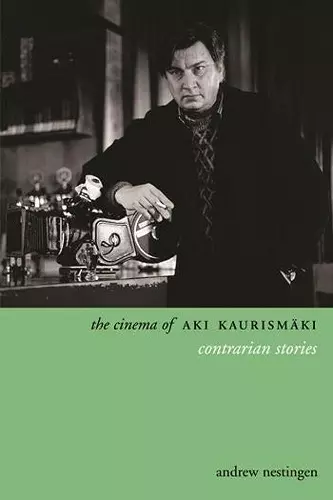The Cinema of Aki Kaurismäki
Contrarian Stories
Format:Hardback
Publisher:Columbia University Press
Published:6th Sep '13
Currently unavailable, and unfortunately no date known when it will be back

Andrew Nestingen's The Cinema of Aki Kaurismaki is the best, most nuanced, and most intellectually acute work to have been produced on the Finnish filmmaker's work, and it is also the first major study of the director in English. More than a monograph, Nestingen's study provides sensitive new approach to auteurist scholarship in general, opening up new vistas for studies of cinematic direction. Nestingen chooses to study Kaurismaki's authorship from four angles of approach, or four 'stories', as he calls them: Kaurismaki as Auteur, as Bohemian, as Nostalgic, and as Finn. It is Nestingen's contention that the stories that grow up among critics and audiences about particular cinematic authorships are an integral part of the critical apparatus, so that parsing these stories produces significant insight into the significance of the director's films. The stories we tell each other, in other words, about Aki Kaurismaki, or any director, have a direct bearing on how we understand their work. And all of these four stories Nestingen identifies, as stereotyped as smooth as they might seem on the surface, rapidly break up into vexed ambiguities, revealing a variety of tensions and fault-lines. For instance, Kaurismaki the Auteur resides uneasily on the boundary between European art cinema and Hollywood as source of inspiration, while Kaurismaki the Bohemian touts his status as rebel and outsider, even while he depends on the security and support of a wealthy social welfare state for his life and art. Kaurismaki the Nostalgic crafts a world constructed of objects, voices, and images from a lost or imagined past, but as a subjectively felt experience rather than a museum archive. And Kaurismaki the Finn both embodies the stereotypes associated with his small nation and turns them to his own subversive uses, creating a space for a discussion of 'minor' nations in the world of filmmaking, film production, and film distribution. In Nestingen's study, this apparently oddball filmmaker from a little country on the margins of Europe becomes a fascinating test case for a battery of new ways to consider art film authorship. Nestingen is uniquely positioned to discuss Kaurismaki's authorship in a fully informed and penetrating way: he speaks fluent Finnish and has studied and taught Finnish literature and culture for many years, he is fully familiar with European and American cultural history (with a special emphasis on cinema), he is a sophisticated film scholar conversant with a broad array of theoretical discourses, and he writes in an absolutely lucid and engaging style. He ranges from Garrison Keillor to Theodor Adorno with ease, bringing the reader easily into the complex matrix of his argument without any obfuscating jargon. The Cinema of Aki Kaurismaki is obviously a key addition to scholarship on the Finnish director, offering readers novel insights into Finnish culture along the way. But it is also an indispensable study for those interested in cinematic auteurism in its most recent incarnations. -- Linda Rugg, University of California, Berkeley As the first comprehensive study in English of this acclaimed and enigmatic Finnish filmmaker, the importance of Andrew Nestingen's work should be obvious. The book is equally stimulating and valuable, however, for its rethinking of film authorship through an array of revisionist approaches. Through these, Aki Kaurismaki emerges as a complex, contrarian figure whose films disrupt and engage the essential debates of cinema studies within the contexts of late modernity. -- Linda Badley, Middle Tennessee State University In this engaging investigation of the aesthetics and the interpretive frames of Aki Kaurismaki's films, Andrew Nestingen scrutinizes the conventional readings of Kaurismaki as a romantic outsider, an idiosyncratic Finn and a social critic - and goes beyond them. Nestingen discusses Kaurismaki's filmmaking at the intersection of national film culture and politics, transnational festival circuits and world cinema market, offering it not as a case of Finnish or European cinema but as an illustrative case of the multi-local and multinational composition of all national cinemas. In Nestingen's account, Kaurismaki stands out as an auteur of contemporary world cinema, a director whose films trade in contradictions, engage with multiple times and places and speak in several registers. An essential reading for critics, scholars and fans alike, this book will be formative for the way we think about the cinema of Aki Kaurismaki, and about the cinemas of small-nations. -- Anu Koivunen, Stockholm University
Aki Kaurismaki is an enigma, an eminent auteur who claims his films are a joke. Since 1983, Kaurismaki has produced classically-styled films filled with cinephilic references to film history. He has earned an international art-house audience and many prizes, influencing such directors as Jim Jarmusch, Quentin Tarantino, and Wes Anderson. Yet Kaurismaki is often depicted as the loneliest, most nostalgic of Finns (except when he promotes his films, makes political statements, and runs his many businesses). He is also depicted as a bohemian known for outlandish actions and statements. The Cinema of Aki Kaurismaki is the first comprehensive English-language study of this eccentric director. Drawing on revisionist approaches to film authorship, the text links the filmmaker and his films to the stories and issues animating film aesthetics and history, nostalgia, late modernity, politics, commerce, film festivals, and national cinema.
ISBN: 9780231165587
Dimensions: unknown
Weight: unknown
224 pages